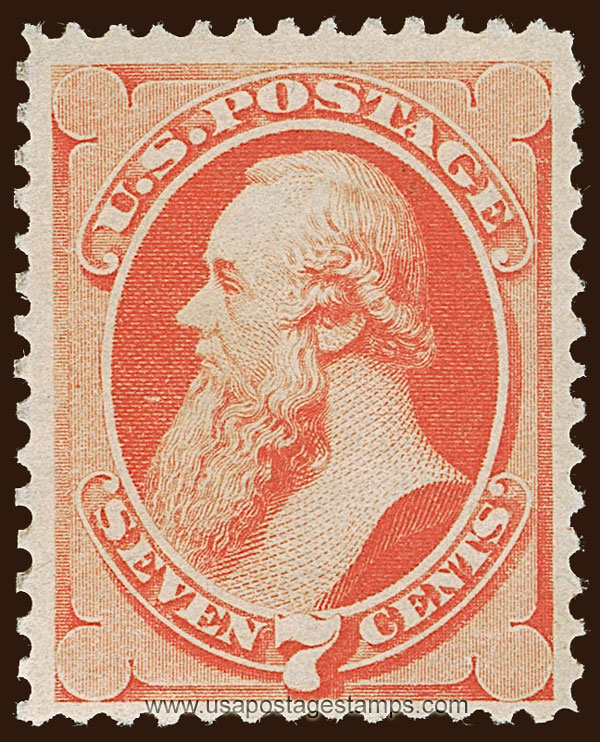US 1871 Edwin Stanton (1814-1869) 7c. Scott. 149

Series: 1870-71 National Bank Note Co. Not Grilled
Issued date: 01-03-1871 (dd/mm/yyyy)
Face value: 7c.
Emission: Definitive
Catalogue No:-
Scott (USA): 149
Stanley Gibbons (UK): 151
Michel (Germany): 40
Yvert et Tellier (France): 43
Dimensions (height x width):
28.6mm x 25.4mm
Stamp Colors: Vermilion
Perforation: line 12
Paper: White wove paper, thin to medium thick
Themes: Politicians, Famous People, Heads of State, Men
Note: Without grill
Total print: 2,070,000
Issued date: 01-03-1871 (dd/mm/yyyy)
Face value: 7c.
Emission: Definitive
Catalogue No:-
Scott (USA): 149
Stanley Gibbons (UK): 151
Michel (Germany): 40
Yvert et Tellier (France): 43
Dimensions (height x width):
28.6mm x 25.4mm
Stamp Colors: Vermilion
Perforation: line 12
Paper: White wove paper, thin to medium thick
Themes: Politicians, Famous People, Heads of State, Men
Note: Without grill
Total print: 2,070,000
Description:- Edwin McMasters Stanton (1814-1869) was an American lawyer and politician who served as Secretary of War under the Lincoln Administration during most of the American Civil War. Stanton's management helped organize the massive military resources of the North and guide the Union to victory. However, he was criticized by many Union generals, who perceived him as overcautious and micromanaging. He also organized the manhunt for Abraham Lincoln's assassin, John Wilkes Booth.
After Lincoln's assassination, Stanton remained as the Secretary of War under the new US president, Andrew Johnson, during the first years of Reconstruction. He opposed the lenient policies of Johnson towards the former Confederate States. Johnson's attempt to dismiss Stanton ultimately led to Johnson being impeached by the Radical Republicans in the House of Representatives. Stanton returned to law after he retired as Secretary of War. In 1869, he was nominated as an Associate Justice of the Supreme Court by Johnson's successor, Ulysses S. Grant, but Stanton died four days after his nomination was confirmed by the Senate.
Sources: en.wikipedia.org/wiki/Edwin_Stanton
After Lincoln's assassination, Stanton remained as the Secretary of War under the new US president, Andrew Johnson, during the first years of Reconstruction. He opposed the lenient policies of Johnson towards the former Confederate States. Johnson's attempt to dismiss Stanton ultimately led to Johnson being impeached by the Radical Republicans in the House of Representatives. Stanton returned to law after he retired as Secretary of War. In 1869, he was nominated as an Associate Justice of the Supreme Court by Johnson's successor, Ulysses S. Grant, but Stanton died four days after his nomination was confirmed by the Senate.
Sources: en.wikipedia.org/wiki/Edwin_Stanton




